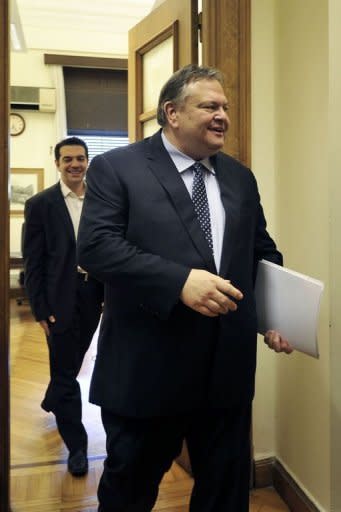Greece gets more cash as coalition talks fail
Greek political parties Wednesday failed to form a viable government amid warnings by creditors that a loan to be paid on Thursday could be the last if Athens failed to honour repayment commitments. The warnings came after the leader of the radical left-wing party, who had been charged with forming a government, told international lenders that any cabinet he heads would renege on the terms of the 240-billion-euro ($311 billion) bailout. Late Wednesday, Alexis Tsipras said however that he was giving up efforts to form a coalition government. "We cannot make true our dream of a left-wing government," he told his Syriza parliamentary group which came second in the weekend election. "Tomorrow I shall hand back the mandate given to me by the president of the republic and we shall continue to take part in the constitutional processes," he added. It will now be Socialist leader, Evangelos Venizelos, whose party came third in Sunday's elections, to attempt to form a government. "I will receive a mandate (to form a government) and continue the national effort," the Pasok leader said after meeting Tsipras. Tsipras had been tasked on Tuesday with forming a government after the conservatives, who secured the largest number of parliamentary seats, failed to hammer out an alliance. In Brussels, a European Union official told AFP that Greece would receive a 4.2-billion-euro loan as expected on Thursday, but a further one billion would be held back till Monday. Eurozone officials who met Wednesday evening "decided to leave the decision on disbursement of one billion to the Eurogroup on Monday," said the source, referring to the eurozone finance ministers. The political uncertainty sent markets and the euro tumbling, as fears resurfaced of Greece quitting the eurozone before the year is out after elections that saw voters roundly reject crippling austerity measures. Should Venizelos fail to put together a coalition, the president would be force to call on all elected officials to form a "unity" government. If this cannot be done by May 17, new elections will be called. Greek parties, meanwhile, have been warning that they might not be able to live up to commitments earlier made to the European Union and to the International Monetary Fund for further budget cuts. Even the leaders of the outgoing Pasok-New Democracy coalition that signed off on the agreement with the IMF and the EU on March 9 have started to suggest that the deal would have to be reopened. Such talk has angered a number of leaders in Europe. Luxembourg Foreign Minister Jean Asselborn warned that future loans would not be forthcoming unless Greece installed a stable government. "We have to say to the Greek people right now that the situation is serious, that no European Union country will be able to release even a portion of the 130 billion euros for the Greeks, if there is no functioning government that respects the rules and manages the disbursed money," he said in Brussels. Eurozone finance ministers are due to meet on Monday in Brussels. Speaking in Berlin, German Chancellor Angela Merkel Wednesday stressed that EU countries that have signed the bloc's fiscal pact for greater budgetary discipline must stick to what they have agreed. "Everyone must stick to the things we have agreed. Twenty-five countries have already ... signed the fiscal pact," Merkel told reporters in remarks seen as directed at both Greece and France, whose president-elect Francois Hollande has also said he wants to renegotiate the deal. German Finance Minister Wolfgang Schaeuble added, "If Greece wants to remain in the eurozone, there is no better solution than the path it has already taken. Referring to austerity cuts and reforms in return for loans, he said, "You can't have one without the other." Speaking in Athens, Tsipras had earlier said that the result of the election, which decimated the pro-austerity parties, "has clearly nullified the loan agreement and (pledges) sent to Europe and the IMF". "Citizens have crushingly voted against the barbaric policy of loan agreements. This was a mature, conscious political choice," he said on television. Conservative New Democracy leader Antonis Samaras conceded that it was "certainly realistic" to renegotiate the bailout terms to give the Greek economy some respite. Socialist rival Venizelos also said it was necessary to "look for the best amendment possible of the terms" of the agreed austerity measures. But outgoing Prime Minister Lucas Papademos' economics advisor warned that throwing the austerity measures to the wind would mean leaving the eurozone. "If we say no to everything, we leave the eurozone," warned Gikas Hardouvelis. European stock markets and the euro slid further on Wednesday as investors sought shelter from the strains in the eurozone driven by the political upheaval in Greece and France. On the eurozone bond market, borrowing rates for Spain and Italy rose sharply while Germany attracted safe haven flows, driving its borrowing rate to record lows.




